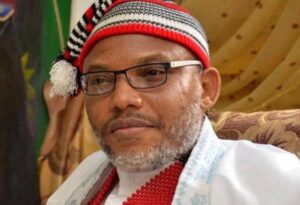 A group of South-East members of the House of Representatives, led by Hon. Ikenga Ugochinyere, has appealed to President Bola Tinubu to utilize constitutional provisions to halt the ongoing trial of Nnamdi Kanu, the detained leader of the Indigenous People of Biafra (IPOB).
A group of South-East members of the House of Representatives, led by Hon. Ikenga Ugochinyere, has appealed to President Bola Tinubu to utilize constitutional provisions to halt the ongoing trial of Nnamdi Kanu, the detained leader of the Indigenous People of Biafra (IPOB).
Their plea comes in the wake of the court’s rejection of Kanu’s bail application, which they view as a setback to the region’s healing process and the restoration of peace.
Justice Binta Nyako dismissed Kanu’s bail request on Tuesday and ordered an accelerated hearing of the criminal case against him. Speaking on behalf of the South-East lawmakers present in court, Ugochinyere expressed their disappointment, emphasizing that granting bail to Kanu would have provided an opportunity for dialogue and the pursuit of peace in the South-East.
Ugochinyere stated, “We received the news of the bail rejection with deep sadness, as it signifies a missed opportunity to initiate the healing process in our region. Granting Kanu bail would have created an avenue for meaningful discussions towards achieving peace in the South-East.”
He further highlighted recent instances where the Federal Government dropped criminal charges against individuals like Omoyele Sowore, as well as allowing Sunday Igboho to return home. Ugochinyere called upon President Tinubu and the Attorney General to invoke their powers under Section 174 of the 1999 Constitution to discontinue the trial in the interest of the public and justice.
Meanwhile, Kanu made a plea to the Federal High Court in Abuja to transfer him to Kuje prison instead of returning him to the custody of the Department of State Services (DSS), where he has been held since 2021. Kanu alleged that the DSS lacked adequate medical facilities and claimed there was a plan to ensure his demise while in their custody.
After the bail application was declined, Kanu spoke out about his health concerns, including congestive heart failure and a swollen foot. He expressed his inability to conduct a proper defense due to restricted access to his lawyers and claimed that false statements were being attributed to him.
In response, Justice Nyako expressed reservations about transferring Kanu to Kuje prison, citing security concerns and previous instances of escaped terrorists. Kanu’s counsel argued that the DSS custody was no longer safe, while the counsel for the Federal Government asserted that bail is typically not granted to individuals charged with terrorism.
Kanu made a passionate appeal for house arrest, citing his need to prepare for his defense and questioning the evidence against him. The judge advised him to submit a formal application, and the matter was adjourned until April 17 for further proceedings.
Following the court session, Kanu distanced himself from the violence in the southeastern part of the country and vowed that those responsible for such acts, under the guise of being IPOB members, would face consequences. He asserted that his release would restore peace to the entire South-East, as any criminal activity would be decisively dealt with.
Nnamdi Kanu has been facing charges related to terrorism and treasonable felony since 2015. Although he was previously released on bail for health reasons in April 2017, he fled the country following a military raid on his residence in September 2017.

